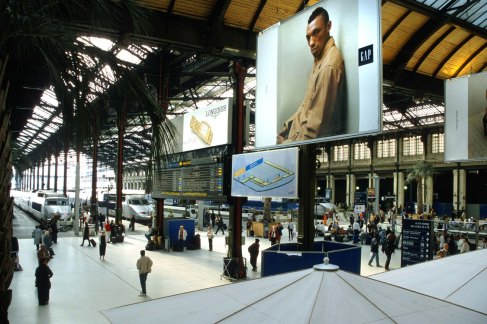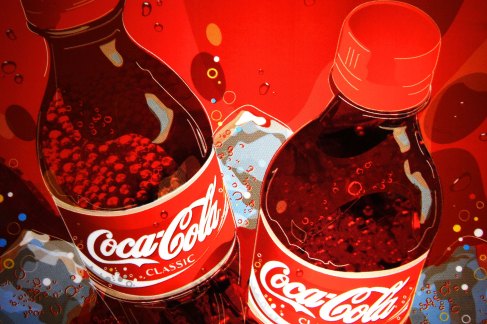So, I’d just like to point out that I’m not necessarily religious or do actually believe in Heaven, but for the sake of this post, I put that aside.
Today’s society is highly commercialised. And I mean heavily. There hasn’t been a single day of my life where I’ve followed through with my everyday routine and haven’t been bombarded with advertisement, propaganda and promotion. Somebody, somewhere, is somehow always insisting that this new product is the next best thing. And I should take their word for it and give them money. And I’m not anti-advertisement, hell, I do it for this very blog! It makes sense too, because being realistic, it’s unlikely something is going to become famous without some form of advertisement. It makes people aware- and that’s not a bad thing. Being aware of insurance companies, new hair products, a new film, awesome blogs (teehee), it’s all useful in some way or another. I can’t imagine a world without bus posters, T.V adverts, commercials before a movie at the cinema (although those are quite annoying)- they all create part of the picture we have of civilisation. So, why have I summoned you all here? Not to advertise advertisement, (see what I did there?) but to express my utter bafflement at How. Commercialised. It’s. All. Become.
Christmas. Christmas is a religious holiday, a time for friends and family to get together and potentially exchange gifts, and for a large number of people it’s good fun. And what would Christmas be without our familiar, chubby faced, pink cheeked Father Christmas? Famously draped in red and smiling cheerfully at us from the front’s of Christmas cards and shop windows. But Santa wasn’t always red. Oh no my friends, dear Saint Nick was green. Like a rather large, chuckling leprechaun. But a green Santa delivering the presents? God no, unless he’s turned vegetarian or something! And why?
Advertisement. It was good old Coca Cola that swapped his green coat for a red to fit him to the brand and use him as commercialisation. How exploited Saint Nick must feel.
And again, what would Christmas be without those exciting Christmas television adverts? On Twitter, the majority of Christmas tweets I saw were along the lines of “Saw my first Xmas advert of the year on telly! Feeling them #ChristmasVibes”
They excite a lot of us. But they are pure commercialism. They just want us to buy their stuff.
There’s that Christmas spirit!
(Shame Christmas is over, this blog would have fitted nicely…)
My point is not to say that everything we hold dear to our hearts is nothing but power-hungry companies desperate for our money, but think about the little things we do each day, and how much it’s all affected by some form of advertising. And like I said, this isn’t necessarily a bad thing. In fact, in London a while ago, buses started parading the city with their usual bus posters, but instead of the newest phone, the advert read “Some people are gay. Get over it.”
Still advertisement. But considerably positive, no?
On a not entirely but somewhat separate note, I also find it quite scary the way adverts can be fitted to individual. If anyone here has a Facebook, I’d like to point out that posts, images and videos that you Like and view are collected, and from this information, Facebook knows what you’re into and what adverts should be posted on your wall.
They are catered to YOU.
Have a club card for a big business like Boots, Tesco or Asda? (All British brands… replace with famous brands from your country where necessary) The business is able to access data on what you purchased on your club card, and from this they build a profile of you. Bought some cat food last week? They assume that this means you probably have a cat. This data is stored on files, and other companies can choose to buy this data off the business. For example, Tesco knows you probably have a cat. Whiskas (a cat food brand) can buy your profile off Tesco, and now they know you have a cat, they will send you cat food pamphlets, or maybe an insurance company might buy that data off Tesco and send you pet insurance offers. Everything has been considered to ensure maximum sales.
Am I the only one who finds this CREEPY?
I could go on and on about the sly and somewhat clever but mostly disturbingly stalker-ish ways our world is commercialised, but back to the original question. Which is a slightly irrelevant and unrelated one.
Can anyone really avoid commercialism? Even if we don’t realize it, discussing that awesome new episode of X T.V show which aired last night in front of a crowd of people, no matter how big or small, is a form of advertisement. We do it all the time- humans love to persuade and influence. So, according to what I know about Heaven (which may be completely different to your interpretation), Heaven would be a land of perfection. Existence in pure happiness and bliss. The ideal, fantastical world. And whether or not you even believe in Heaven, how much would we actually be able to avoid commercialism which seems to unavoidably follow society? If advertisement is so common- even simple discussions can involve it- who’s to say we’ll prevent ourselves from turning Heaven into another commercialised society?
Wouldn’t that just be the weirdest thing?
I’m going to draw this blog to an end… I’ve covered several aspects of commercialism. I hope you enjoyed it and that it wasn’t too scattered!
Thanks for reading!
-The Cookie Element
Over and out.
(P.S. The Heaven reference was just a pretext for considering how far humans could take advertisement, and this blog wasn’t really meant to particularly touch upon religion in any way really.)


